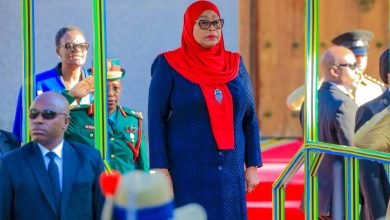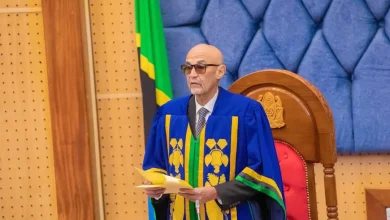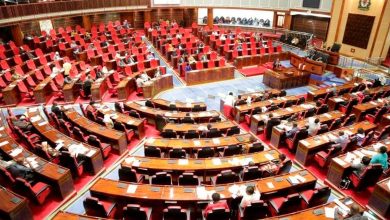NRA focuses on agri-industry links in central zone

DODOMA: TRANSFORMING Tanzania’s agriculture into a modern, technology-driven and commercially vibrant sector is among the top priorities outlined in the National Reconstruction Alliance (NRA)’s 2025-2030 election manifesto.
The party emphasises that agricultural growth must not only guarantee food security but also serve as a springboard for national industrialisation and job creation.
According to the NRA, the country’s future prosperity depends on building a strong and competitive economy anchored in four pillars—agriculture, industry, economic services and enabling infrastructure.
This approach, the party says, will ensure sustainable production, enhance rural incomes and reduce reliance on imports.
The NRA’s long-term national plan aims to transform agriculture, livestock and fisheries to guarantee food sufficiency, while at the same time supporting resilient economic growth and self-reliance.
Its presidential candidate, Mr Hassan Almas, told the ‘Daily News’ in Dodoma that while the party’s strategy covers all regions, special emphasis will be placed on the Central Zone—comprising Dodoma and Singida—because of its semi-arid nature, strategic crops and high potential for industrial linkages.
“Currently, Tanzania faces a shortage of edible oil, yet this region has a favourable climate for sunflower cultivation,” said Mr Almas.
“Addressing the challenges facing the agriculture sector here means directly addressing the edible oil shortage in the country. We will make this region a model for agro-industrial transformation.”
Empowering Farmers Through Inputs and Innovation The NRA leader said his government would empower farmers through the supply of affordable inputs, enhanced extension services and improved access to credit facilities.
He emphasised the use of modern irrigation systems and greenhouse technologies to ensure year-round production.
“Tanzanian farmers must move away from depending on rain-fed agriculture. We will introduce irrigation schemes and smart-farming technologies that guarantee consistent yields, especially in regions vulnerable to drought,” he stated.
Mr Almas explained that under NRA’s plan, every district in Dodoma and Singida will have demonstration farms to showcase improved seeds, pest control methods and postharvest technologies.
ALSO READ: New association in plan to boost auto industry
The party also plans to establish a national input distribution programme to reduce the cost of seeds and fertilisers.
Agriculture–Industry Linkage as an Engine of Growth Mr Almas noted that agricultural growth without industrial value addition is unsustainable.
“We have seen how farmers work hard but remain poor because they sell raw crops. NRA will establish large, medium and small industries in crop-producing zones to ensure farmers have reliable markets,” he said.
He mentioned sunflower, maize and sesame as examples of strategic crops that can fuel Tanzania’s industrial development.
“If we process sunflower locally, we will not only meet national oil demand but also export refined products. This will create jobs, increase revenue and boost farmers’ incomes,” he added.
The NRA manifesto also pledges to revive abandoned factories and support agroprocessing ventures through public–private partnerships.
“Industrialisation must go hand in hand with rural transformation. When industries thrive, farmers thrive too,”
Almas emphasised. Water and Energy at the Heart of Development Recognising that both agriculture and industry depend on water and energy, Almas said NRA would focus on renewable solutions to overcome shortages.
“If entrusted with leadership, we will harness solar and wind power to run underground water pumps, especially in arid areas. These systems will supply water for irrigation, livestock and domestic use,” he said.
The move, he explained, would help ensure water security while supporting the NRA’s broader strategy for rural industrialisation.
“Reliable power and water will make it easier to set up small industries for oil pressing, dairy processing and food packaging right where raw materials are produced,” he added.
Harnessing ICT and Dual Citizenship for Transformation On information and communication technology (ICT), Mr Almas pledged to promote Artificial Intelligence (AI) and attract global expertise through dual citizenship.
“We have Tanzanians abroad with world-class ICT experience. Granting them dual citizenship will enable knowledge transfer and investment,” he said.
He noted that the NRA would reform the Citizenship Act to allow qualified professionals to contribute to the country’s digital economy.
“We will not isolate ourselves from the global ICT revolution. Our goal is to make technology part of every development sector—from agriculture to education,” he added.
Long-term Vision for National Stability Mr Almas also unveiled plans for a National Long-term Development Policy—a blueprint spanning 100 years to guide Tanzania’s growth regardless of political changes.
“Every political party comes with its own agenda, creating policy discontinuity. NRA will establish a framework that outlives political terms so that development is steady, predictable and inclusive,” he said.
He further assured that an NRA-led government would uphold the rule of law, ensure free basic healthcare and clean water, protect national unity, and continue building on the legacy of previous administrations.
Quoting the party’s manifesto, he said NRA’s leadership would form an inclusive government representing all political parties to foster unity and end sabotage disguised as partisan competition.
“We will invest in statistics, governance, human dignity, and equality to strengthen national accountability,”
Almas stressed, promising also to restart the stalled constitution making process to preserve peace and the Union.
He emphasized that the NRA would reduce the number of ministries to ten, cut unnecessary spending, and redirect resources to research, science, and innovation to spur socioeconomic development across Tanzania.





